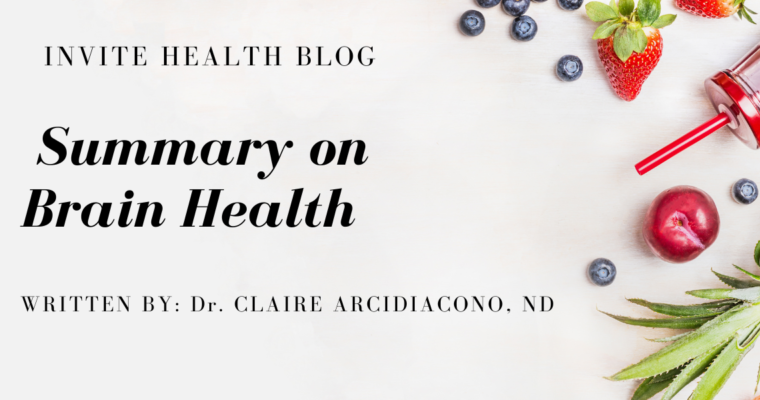Subscribe Today!
Please see below for a complete transcript of this episode.
THE MINERAL MAGNESIUM & OUR BRAIN, INVITEⓇ HEALTH PODCAST, EPISODE 666
Hosted by Jerry Hickey, Ph.

*Intro Music*
InViteⓇ Health Podcast Intro: [00:00:04] Welcome to the InViteⓇ Health Podcast, where our degreed health care professionals are excited to offer you the most important health and wellness information you need to make informed choices about your health. You can learn more about the products discussed in each of these episodes and all that Invite Health has to offer at www.invitehealth.com/podcast. First time customers can use promo code podcast at checkout for an additional 15% off your first purchase. Let’s get started. † [00:00:34]
*Intro Music*
Jerry Hickey, Ph: [00:00:40] The objective of this episode is to discuss the mineral, magnesium and its importance for our brain. It’s incredibly important for our brain. It’s a very abundant mineral in our body. There are several abundant minerals as calcium and sodium and potassium and phosphorus and sulfur and magnesium up there. It’s so important, we need it on a daily basis. And according to a lot of studies, looking at blood levels and the foods people consume, many of us Americans are getting far too little magnesium in our food. And this has serious consequences over time. Magnesium works all over our body, it does so many things. They clock magnesium as having over 300 important activities in the human body. For instance, you need magnesium. Magnesium interacts with zinc and vitamin D to control our blood sugar. Diabetics are very typically commonly low in magnesium because they lose it in the urine. So, it’s a very important supplement for diabetics. We’ve done episodes on that. Magnesium seals calcium into our bones, it keeps our bones strong. You need magnesium to activate vitamin D, and vitamin D is needed to reduce inflammation in the body, to build bone, to control calcium absorption and absorption of other minerals like phosphorus. But vitamin D is also very important for our immune system. Our immune system cells can actually activate vitamin D, that’s how important it is. You need magnesium to release melatonin at night. Melatonin is involved with brain health and memory, building bone, likely fighting off cancer, controlling daytime chronic pain. Melatonin is important for the immune system. Melatonin is important for the digestive tract. You need magnesium to stabilize our energy, we make energy out of sugar. That’s how the body works. It’s something called ATP, and most of our ATP is attached to magnesium, so you don’t burn it up in a flash, so, you have nice ongoing energy levels. So, there’s hundreds of important activities in our body, including heart, health and blood pressure control, muscle function, nerve function. It’s clearly an important mineral, and after you read, after you hear this episode, it will be obvious that it’s clearly an important mineral for brain health, for mental health, and for our memory and mental energy. So, welcome to my episode, The Mineral Magnesium and our Brain. You can find all of the Invite podcast episode for free wherever you listen to podcasts or just go to invitehealth.com/podcast, you can find all of the information relating to this episode in the description. Please subscribe and leave a review, and by the way, you can also find Invite on Instagram and Facebook and Twitter at Invite Health. So, I want to get into this, it’s really cool. † [00:03:38]
[00:03:39] Low levels of magnesium have been linked to many brain disorders. Now people who are migraineurs, people who suffer with migraines, they tend to get some benefit from magnesium along with other things, like sometimes vitamin B2 can be helpful for Migraineurs. Having a low magnesium is related to anxiety and depression and insomnia and stroke risk and seizures and even dementia. It’s involved with chronic pain, lacking magnesium, it’s involving muscle twitches and poor muscle function, poor nerve tissue control. So, a very important job for magnesium is regulating neurotransmitter production and release. So, neurotransmitters are natural chemical messengers in our brain, and you only need tiny releases of them that help the brain cells communicate with each other. And this also is a way of connecting our brain to our body. So, I’ll give you for instance. Glutamate and GABA are two major neurotransmitters, we know of a little over a hundred neurotransmitters in the brain. Glutamate and GABA in particular rely on magnesium for their function. And these are two incredibly important neurotransmitters. Some people think they oppose each other. They actually work together. There’s a balance between them, glutamate excites the brain, and that level of excitation has to be tightly controlled, otherwise it leads to excitotoxicity, we’ll go into that in a minute. GABA, which stands for Gamma Aminobutyric acid, relaxes the brain. For instance, certain drugs like benzodiazepines, work mostly by affecting GABA receptor sites. So, let’s take an example, how these neurotransmitters work together. Learning the brain cells that store the memory, GABA relaxes them and allows them to open up. Glutamate gives them the energy, and then a third neurotransmitter acetylcholine actually pushes the information into the brain cell and then there’s kind of like a reverse of all that activity. So, you trap the information. Here’s the problem, too much glutamate, not a good thing. Just like too much, GABA would not be a good thing. There has to be a balance. So, low magnesium levels lead to excessive glutamate activity. It’s called excitotoxicity. The brain cells have to work so hard that they literally burn themself out. It literally kills brain cells, it’s neurotoxic. So, glutamate, excited, toxicity, poor regulation of glutamate, and of course, this is, these are extreme scenarios. It’s implicated in Alzheimer’s disease burning out these brain cells, Parkinson’s disease, which initially will be a movement disorder that eventually can affect your breathing, which is scary, but also it can lead to Parkinson’s dementia, which is sort of like the second most common dementia. Huntington’s disease, epileptic seizures and ALS, Lou Gehrig’s disease, by the way, they believe that Lou Gehrig didn’t die from Lou Gehrig’s disease. He died from a number of injuries to his brain during his career. So, here is a study from Drexel University. It’s in the journal Advances in Nutrition, Drexel University, very famous university over in Pennsylvania. Magnesium plays a major role in disease prevention and maintaining good health. Reduced magnesium levels in your blood is implicated in migraines, diabetes, cerebrovascular accidents, which is the fancy way of saying a stroke, hypertension, which is high blood pressure, cardiovascular disease and Alzheimer’s disease for a high quality academic research institution like Drexel to come out with that kind of report says a lot, because that means there’s a lot of research on magnesium and enough research that shows low levels of magnesium are implicated in these conditions. In fact, magnesium is so important that there are entire conferences devoted to the mineral, magnesium and books written on magnesium. I know because I’ve contributed to some of these books, and there’s journals dedicated to the mineral, magnesium. That’s how important it is. † [00:08:39]
[00:08:41] Let’s just look at the bone, and we’ve done an episode on this. If you lack magnesium, the calcium crystals in your bone expand and your bones become fragile, it’s easier to break your bones. So, it is so important, the mineral magnesium in so many ways. Now there’s a kind of a prodromal stage before Alzheimer’s in many people, if they have true mild cognitive impairment, it’s almost a sure sign as almost a certainty that they’re going to go into Alzheimer’s disease. So, in mild cognitive impairment, these people are still functioning, they’re still at home. But it’s obvious to everyone, including themselves, that their memory and their brain is not working properly. So, here’s the journal Nutrients, June 10th, 2023. So, it’s very recent. It’s the Academy of Nutrition and Health in China, along with other academic research institutions, because no one institution can do a study like this, it’s too involved. There are too many people hours involved, there’s too much analysis involved, and writing involved, etc… So, they’re updating the information on magnesium and brain function based on the newest data. And what they found, so they’re looking at magnesium and specifically mild cognitive impairment, our risk of developing mild cognitive impairment. It’s 1006 older adults and they did a series of tests, the auditory learning test, which is, you know, obvious what that is, but the trail making test. Now, in this test, you’re looking at a person’s ability to pay attention and switch tasks, etc., but they also used a digit symbol substitution test. And what that is, they give your digits, a number between one and nine, and then you have to match the number to symbols in 90 seconds, they see how many times you can, so, if your pinky is number one on your left hand and it has to match to assemble. How many times do that does that happen? Over 90 seconds. They did the verbal fluency test, and they combined these tests to really see what was going on with paying attention and memory and language comprehension. They also used the combine test for executive function, which tells a great deal about brain function. Patients who developed mild cognitive impairment had lower blood magnesium levels than those with healthier levels of magnesium. And the people with healthy levels of magnesium obviously had better brain function. So, here’s what they found. They found that the patients who developed mild cognitive impairment had lower blood levels of magnesium than those with healthier brain function, with better brain function. And the magnesium in this study was protective against mild cognitive impairment. And what they found is those people with magnesium intake in the lowest 25% range, increased their risk for developing mild cognitive impairment, which typically leads into Alzheimer’s by almost 50% compared to those in the top 25%. So, a higher blood level of magnesium was connected with greater verbal fluency. And that digital, that digit symbol substitution test where they put a number on each finger and you have to attach it to symbols, which is not easy, I would think, for someone who’s losing their memory. So, the magnesium absolutely improved brain function. If you had more magnesium in your blood and it was reducing the risk of mild cognitive impairment. So, this is a very important finding. † [00:12:41]
INTRODUCTION TO BRAIN HEALTH & MEMORY, INVITE HEALTH BLOG>>READ NOW!
[00:12:42] Now, they went on to look at what was happening, and they found that low magnesium led to brain inflammation. You were releasing mediators. This is how they could gauge it. They found mediators that were elevated that would trigger inflammation in the brain, such as tumor necrosis factor alpha and nitric oxide or interleukin A. The inflammation contributes to neurodegeneration and it kind of confuses the brain, mixes up the brain, prevents it from working effectively and efficiently and normally, but it is also killing brain cells. Now, the thing is, the magnesium had been shown to inhibit the production of excessive concentrations of beta amyloid proteins. So, that’s really interesting, that’s previous studies. Beta amyloid is a sort of protective protein in the brain, but you have to dispose of it. You have a system in the brain called the lymphatic system. And when you’re sleeping and resting, the system goes into its working phase, and it breaks down things like these proteins and gets rid of them. So normally these proteins are not a bad thing, but if that lymphatic detoxification system is not working effectively and efficiently, the protein builds up and it groups together and what happens? It becomes toxic to the brain cells, and it kills off brain cells. And this is a major part of Alzheimer’s. Now, I mean, looking at just the various things magnesium does in your brain, it lowers inflammation in the brain and activates vitamin D, there are receptor sites for vitamin D in the brain to make the brain work properly. And just like those receptor sites in the brain for vitamin K, they make the brain work properly and they reduce inflammation in the brain. You need it to release melatonin from the pineal gland when melatonin does a million things, including for your memory, you need it for neurotransmitter activity and control. You need to magnesium to stabilize blood sugar utilization. Now, that’s really important. Your brain, the dry weight is about £2, so, it’s a very small amount of mass compared to the rest of the body. But the brain is super high energy. It’s a super high energy organ. And how does the brain work with energy? It takes sugar and a convert sugar to something called ATP. And the ATP used to bring the energy. You need the magnesium to stabilize the ATP, in fact, you need magnesium to create the ATP. So, magnesium from a neurological standpoint is essential for neurotransmission, neurotransmission functions and a protective role against over excitation of brain cells, you know, excitotoxicity which burns up brain cells. So, you need it to prevent that, that neuronal cell death, magnesium helps you with migraines, magnesium helps with depression. There are other nutrients that can help with depression, like B vitamins, fish oils and something called Alcar which is Acetyl-L-Carnitine. Magnesium is protective against a stroke; magnesium is protective against anxiety. So, there’s a lot going on with magnesium in the brain. † [00:15:59]
[00:15:59] Now, there’s a number of studies where magnesium helps with depression. And I mean, you could go on PubMed, onto new PubMed, which is Library of Congress Place, where they collate all these studies. There’re millions of studies on there, and if you type in magnesium and depression, you’ll see a whole slew of studies come up. So, here’s one it’s the journal Nutrients February 2023. So, it’s very recent. That’s a number of academic research institutions in Taiwan. They do a lot of research for some reason on magnesium in both Taiwan and China. So, it’s really in their focus over there. But don’t get me wrong, there’s a lot of research going on in Europe and the United States also with magnesium. And here’s what they found, higher blood levels of magnesium led to reduced depressive symptoms and a sampling of the general public. But here’s the important thing. When they looked at their diet, you couldn’t really correlate the amount of magnesium in the blood versus the amount of magnesium in the diet, which indicates that, a couple of things, maybe sometimes certain foods that are supposed to be abundant in magnesium might have depleted magnesium because of the soil. The soil is over farmed, or it could indicate that some people just don’t absorb magnesium as well as other people. That’s why I take a magnesium supplement. I’ll go into that in a minute just to make sure I get enough magnesium. But I thought that was very interesting, very important that the amount of magnesium in the blood did not really match up with the amount of magnesium in their diet. Now, what about anxiety? And we’ll get into like sources of magnesium, what foods have magnesium. Magnesium and anxiety, this is the University of Leeds. Their School of Psychiatry, the University of Leeds has done a number of studies on magnesium and anxiety in their school of psychology. This is in the journal Magnesium Research. I told you, magnesium so important, there’s actual journals dedicated to magnesium. It’s the journal called Magnesium Research. And this is back in 2016. Looking at the available studies, the research indicated that magnesium could treat mild anxiety and also anxiety related to premenstrual syndrome. It helps get rid of that anxiety related to premenstrual syndrome. Now, a year later, same university, different journal, the journal Nutrients. So, it’s University of Leeds, School of psychology. They took 18 studies. They did a meta-analysis, they found 18 studies that were high quality. Magnesium helps anxiety, it was, there is a lot to this. So, here’s the journal Magnesium Research, April 20, 2022, 60 people who are scheduled for open heart surgery, half of them, they gave magnesium. The other half, they gave placebo, which is an inactive agent. And here’s what they found, because they followed them before surgery and after surgery, and they found that the symptoms of anxiety and depression were significantly lower. And the people treated with the magnesium and their quality of sleep improved. So, that’s very important because the magnesium is really safe and it’s not going to interfere with blood thinners or medication, they give people for their heart. And here’s the last study,the Journal Nutrients February 2023. So very recently, it’s a number of academic research institutions in Taiwan. So, we’re back to Taiwan. Higher blood levels of magnesium led to lower levels of depressive symptoms and a sampling of the general public. And once again, the amount of magnesium in the blood did not correlate with the amount of magnesium in their diet. So once again, that’s really important thing. That’s a really important finding. † [00:19:57]
ICYMI:COLLAGEN & THE BRAIN, INVITE HEALTH PODCAST, EPISODE 658>>LISTEN NOW!
[00:19:57] So where can you get magnesium? Oh, legumes. Legumes have magnesium, so that could be lentils, peas, beans, like black beans, soy foods. They, all the legumes have some magnesium. Nuts and seeds like pumpkin seeds, chia seeds, almonds, cashews, walnuts, to name a few. Green leafy vegetables like spinach, whole grains, like whole wheat. Now, me, I eat a really good diet, but I just want to make sure I’m getting enough magnesium. I take according to research, what is the best absorbed magnesium. I take magnesium glycinate. So, here’s an interesting thing. Some forms of magnesium have a laxative effect, like magnesium oxide and magnesium chloride, and some forms of magnesium lack a laxative effect like magnesium glycinate. So why is that? Because of the absorption rate, the magnesium glycinate, it is absorbed so completely and so quickly it doesn’t hang around the intestines to cause a laxative effect. But if you take magnesium oxide or magnesium chloride, they’re not as well absorbed. They hang around the intestines for a longer time and they have a laxative effect. So, if you want to avoid the laxative effect, take magnesium glycinate. It’s easy to get a 200-milligram tablet and you only need one a day. Take it with food, because when you eat food, you release acids that help break down the magnesium because you have to absorb minerals from the small intestine. You don’t absorb minerals that well from a large intestine. So, you want these pills to break down properly and quickly. So, you want a good company, you want the breakdown quickly. So, you take it during meals, so it’ll break down more efficiently. In fact, you can even bite the pill. Magnesium doesn’t taste bad; it tastes like chalk. You could bite the pill and help get digested. You can leave it in your mouth for a minute. And don’t take the magnesium in a high dose like this, the same time you take calcium, because there’s some evidence that they’ll block the absorption of each other. I don’t know if that’s true, but, you know, just avoid it just to make sure. And also, don’t take the magnesium with zinc or iron, because you’re not really going to absorb the Zinc and the iron. So, I used magnesium glycinate, 200 milligrams and take one a day with my dinner. I’m not taking really anything else other than biocurcumin-5-loxin, and the turmeric supplement with my dinner. So, there you go. So, anyway, thank you for listening. I hope you enjoyed and got some information out of this episode. You can find all of the episodes for free wherever you listen to podcasts or just go to invitehealth.com/podcast. You can also find Invite on Twitter, Instagram and Facebook at Invite Health. And thanks for listening and I’m signing off now. Jerry Hickey, nutritional Pharmacist, licensed Pharmacist. And I hope to see you next time in the next episode of the InViteⓇ Health Podcast episode. † [00:19:57]
*Exit Music*











